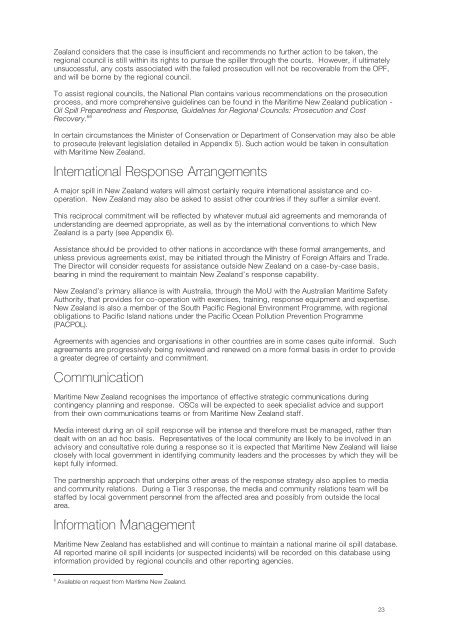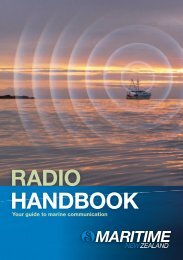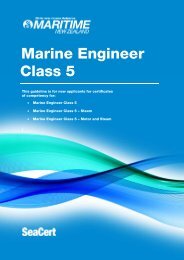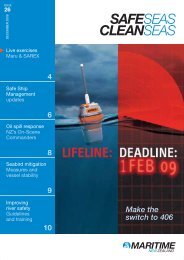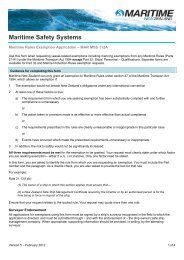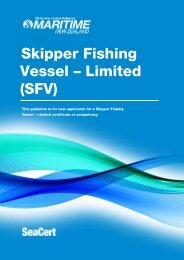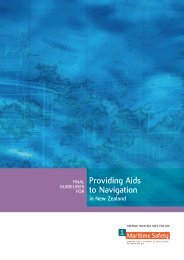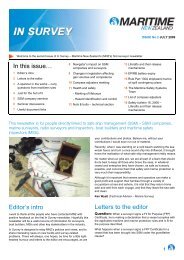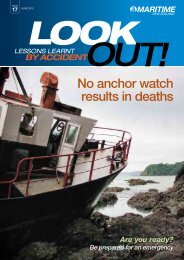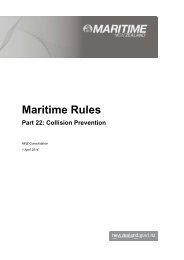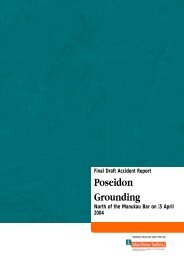New Zealand oil spill response strategy - Maritime New Zealand
New Zealand oil spill response strategy - Maritime New Zealand
New Zealand oil spill response strategy - Maritime New Zealand
You also want an ePaper? Increase the reach of your titles
YUMPU automatically turns print PDFs into web optimized ePapers that Google loves.
<strong>Zealand</strong> considers that the case is insufficient and recommends no further action to be taken, the<br />
regional council is still within its rights to pursue the <strong>spill</strong>er through the courts. However, if ultimately<br />
unsuccessful, any costs associated with the failed prosecution will not be recoverable from the OPF,<br />
and will be borne by the regional council.<br />
To assist regional councils, the National Plan contains various recommendations on the prosecution<br />
process, and more comprehensive guidelines can be found in the <strong>Maritime</strong> <strong>New</strong> <strong>Zealand</strong> publication -<br />
Oil Spill Preparedness and Response, Guidelines for Regional Councils: Prosecution and Cost<br />
Recovery. 66<br />
In certain circumstances the Minister of Conservation or Department of Conservation may also be able<br />
to prosecute (relevant legislation detailed in Appendix 5). Such action would be taken in consultation<br />
with <strong>Maritime</strong> <strong>New</strong> <strong>Zealand</strong>.<br />
International Response Arrangements<br />
A major <strong>spill</strong> in <strong>New</strong> <strong>Zealand</strong> waters will almost certainly require international assistance and cooperation.<br />
<strong>New</strong> <strong>Zealand</strong> may also be asked to assist other countries if they suffer a similar event.<br />
This reciprocal commitment will be reflected by whatever mutual aid agreements and memoranda of<br />
understanding are deemed appropriate, as well as by the international conventions to which <strong>New</strong><br />
<strong>Zealand</strong> is a party (see Appendix 6).<br />
Assistance should be provided to other nations in accordance with these formal arrangements, and<br />
unless previous agreements exist, may be initiated through the Ministry of Foreign Affairs and Trade.<br />
The Director will consider requests for assistance outside <strong>New</strong> <strong>Zealand</strong> on a case-by-case basis,<br />
bearing in mind the requirement to maintain <strong>New</strong> <strong>Zealand</strong>’s <strong>response</strong> capability.<br />
<strong>New</strong> <strong>Zealand</strong>’s primary alliance is with Australia, through the MoU with the Australian <strong>Maritime</strong> Safety<br />
Authority, that provides for co-operation with exercises, training, <strong>response</strong> equipment and expertise.<br />
<strong>New</strong> <strong>Zealand</strong> is also a member of the South Pacific Regional Environment Programme, with regional<br />
obligations to Pacific Island nations under the Pacific Ocean Pollution Prevention Programme<br />
(PACPOL).<br />
Agreements with agencies and organisations in other countries are in some cases quite informal. Such<br />
agreements are progressively being reviewed and renewed on a more formal basis in order to provide<br />
a greater degree of certainty and commitment.<br />
Communication<br />
<strong>Maritime</strong> <strong>New</strong> <strong>Zealand</strong> recognises the importance of effective strategic communications during<br />
contingency planning and <strong>response</strong>. OSCs will be expected to seek specialist advice and support<br />
from their own communications teams or from <strong>Maritime</strong> <strong>New</strong> <strong>Zealand</strong> staff.<br />
Media interest during an <strong>oil</strong> <strong>spill</strong> <strong>response</strong> will be intense and therefore must be managed, rather than<br />
dealt with on an ad hoc basis. Representatives of the local community are likely to be involved in an<br />
advisory and consultative role during a <strong>response</strong> so it is expected that <strong>Maritime</strong> <strong>New</strong> <strong>Zealand</strong> will liaise<br />
closely with local government in identifying community leaders and the processes by which they will be<br />
kept fully informed.<br />
The partnership approach that underpins other areas of the <strong>response</strong> <strong>strategy</strong> also applies to media<br />
and community relations. During a Tier 3 <strong>response</strong>, the media and community relations team will be<br />
staffed by local government personnel from the affected area and possibly from outside the local<br />
area.<br />
Information Management<br />
<strong>Maritime</strong> <strong>New</strong> <strong>Zealand</strong> has established and will continue to maintain a national marine <strong>oil</strong> <strong>spill</strong> database.<br />
All reported marine <strong>oil</strong> <strong>spill</strong> incidents (or suspected incidents) will be recorded on this database using<br />
information provided by regional councils and other reporting agencies.<br />
6<br />
Available on request from <strong>Maritime</strong> <strong>New</strong> <strong>Zealand</strong>.<br />
23


